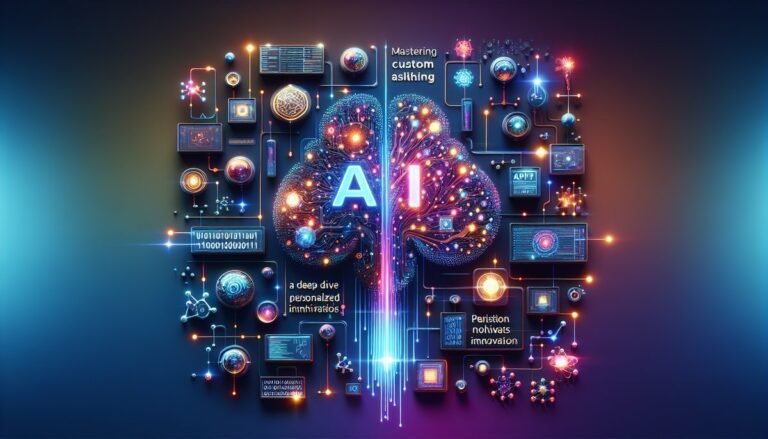As we stand on the brink of a technological revolution, the call for AI Developments Regulation has never been more urgent. The rapid advancements in Artificial Intelligence are not just reshaping industries but are also challenging the very fabric of ethical and legal frameworks worldwide. This surge in AI capabilities is creating a kind of digital arms race, with countries and corporations vying for supremacy in this transformative field. However, without robust regulatory measures, the risks could potentially outweigh the benefits, placing society on a precarious edge.
Understanding the Race for AI Supremacy
The global quest for AI dominance resembles a modern-day gold rush. Nations and companies are investing heavily in AI technologies, hoping to secure a competitive advantage that could define economic and geopolitical landscapes for decades. This intense competition is driven by the promise of AI to revolutionize sectors ranging from healthcare to finance, creating efficiencies and innovations previously unimaginable. Yet, this unbridled pursuit of AI advancement raises significant concerns about accountability, bias, and the ethical deployment of AI systems.
The Ethical Dilemma: Balancing Innovation with Responsibility
In the rush to harness AI’s potential, ethical considerations often take a backseat. The implications of unchecked AI development include biased algorithms, surveillance overreach, and even autonomous weaponry. These challenges underscore the necessity for AI Developments Regulation to ensure that technology serves the public good rather than undermining it. As AI systems become increasingly autonomous, ensuring they align with human values and societal norms becomes a critical task for policymakers and developers alike.
The Role of International Collaboration
Global cooperation is paramount in crafting effective AI Developments Regulation. Just as climate change requires a united front, so too does the regulation of AI. Countries must come together to establish shared standards and guidelines that promote safe and ethical AI use. Without a concerted international effort, the risk remains that divergent regulations could lead to a fragmented landscape, where uneven standards create loopholes for misuse and exploitation.
Regulatory Challenges and Opportunities
Designing regulations for AI is fraught with complexities. Unlike traditional technologies, AI systems are often opaque, making accountability difficult. Regulators must therefore develop innovative approaches that keep pace with technological change without stifling innovation. Opportunities exist for pioneering new frameworks that embrace transparency, stakeholder engagement, and adaptive policy-making. By doing so, we can foster an environment where AI can thrive responsibly.
The path to effective AI Developments Regulation is a challenging yet necessary journey. As we navigate these uncharted waters, the decisions made today will shape the future of AI and its impact on society. It is imperative that we strike the right balance between fostering innovation and safeguarding public interests to ensure that AI remains a force for positive change in the world.
The Urgent Need for AI Developments Regulation
In an era where Artificial Intelligence is advancing at a breakneck pace, the call for regulation has never been more critical. The drive to harness AI technologies is creating a global scramble, each country striving to secure a technological edge. This competitive atmosphere, while fostering innovation, also presents significant risks that necessitate thoughtful oversight. Without proper regulations, the unchecked growth of AI could lead to unintended consequences, from privacy violations to autonomous weaponry.
Balancing Innovation and Safety: The Regulatory Conundrum
Achieving a balance between encouraging innovation and ensuring safety is a central challenge in the realm of AI developments regulation. Regulators must craft policies that protect citizens without stifling technological progress. For instance, privacy concerns are paramount as AI systems increasingly handle sensitive personal data. Robust regulatory frameworks, akin to the General Data Protection Regulation in Europe, are essential to safeguard user information while allowing companies to innovate responsibly. Yet, these regulations must be nimble enough to adapt to the rapid evolution of technology.
Global Disparities in AI Regulation: A Competitive Disadvantage?
Different nations are adopting varied approaches to AI regulation, leading to a patchwork of standards. Some, like the European Union, implement strict policies emphasizing ethical AI practices, while others prioritize economic gains over stringent oversight. This divergence can create competitive disadvantages for businesses operating in regions with more rigorous regulations, potentially stifling innovation. Conversely, countries with lax rules might gain short-term advantages but risk long-term ramifications such as ethical breaches or loss of public trust.
Learning from Past Technological Revolutions
History offers valuable lessons on the importance of regulation in the face of technological upheavals. The Industrial Revolution, for example, brought about immense economic growth but also significant societal challenges. It was through regulation that labor laws and safety standards emerged, ultimately benefiting society as a whole. Similarly, the AI revolution requires a forward-thinking regulatory approach that anticipates potential pitfalls while fostering growth.
Hypothetical Scenarios: The Cost of Inaction
Imagine a world where AI systems are left unchecked. Autonomous vehicles could operate without standardized safety protocols, leading to potential accidents and liabilities. In the corporate world, AI-driven decision-making processes might perpetuate biases if not regulated to ensure fairness and transparency. Such scenarios underscore the importance of establishing comprehensive guidelines to govern AI development and implementation.
Proactive Steps Toward Effective Regulation
To prevent these hypothetical outcomes, proactive measures are essential. Governments, industry leaders, and academia must collaborate to draft cohesive policies that address the multifaceted implications of AI. Public-private partnerships can foster dialogue and share insights, ensuring regulations are well-informed and effective. Additionally, ongoing education and awareness campaigns can help the public understand and engage with AI technologies responsibly.
Future Outlook: Navigating the AI Regulatory Landscape
As AI continues to evolve, so too must the regulatory frameworks that govern it. It is crucial for policymakers to remain flexible, anticipating future developments while addressing current needs. The establishment of international regulatory bodies could ensure uniform standards and prevent regulatory arbitrage. Moreover, incorporating ethical considerations and human rights into AI policies can help ensure that technological advancements benefit all of humanity.
In conclusion, the race for AI superiority underscores the urgent need for comprehensive and effective regulation. By learning from history, embracing innovation, and fostering international cooperation, we can navigate the challenges of the AI revolution and harness its potential for the greater good.
Navigating the Future of AI: Balancing Innovation and Regulation
As we stand on the cusp of a technological revolution, the Artificial Intelligence landscape is evolving at an unprecedented pace. The race for dominance in AI is more than just a technological contest; it’s a strategic maneuver that impacts global power dynamics. Proper regulation is not merely a bureaucratic hurdle but a necessary framework to ensure that AI developments serve humanity’s best interests without compromising ethical standards. By looking beyond conventional technology, we unlock a plethora of opportunities where AI can be applied—ranging from healthcare to environmental conservation—transforming industries and potentially ameliorating some of the world’s most pressing challenges. As we move forward, it’s imperative that stakeholders—governments, corporations, and tech innovators—collaborate to create an ecosystem where AI can thrive safely and equitably. The future of AI is not just about who gets ahead first but about how intelligently we manage the technological advances for the collective good.
What are the key concerns related to AI regulation?
The main concerns revolve around ensuring AI systems are developed and deployed ethically, protecting user privacy, preventing bias in decision-making, and safeguarding against potential misuse of AI technologies.
How can AI regulation impact global competition?
Effective AI regulation can level the playing field by ensuring fair practices and preventing monopolistic control, thereby fostering innovation across different regions and sectors, ultimately benefiting global competition.
Why is looking beyond conventional tech important for AI development?
Exploring unconventional applications allows AI to address unique challenges and enhance sectors like agriculture, climate change, and public health, thus expanding its utility and impact beyond traditional tech industries.
What role do governments play in AI regulation?
Governments are crucial in setting policies and standards that guide ethical AI development and deployment. They also facilitate international cooperation to harmonize regulations, ensuring consistent and fair AI practices globally.
Dive Deeper into AI & Tech
- Ai Content Generators 2025
- Gemini Ai Agent
- Talkie Ai Guide 2025
- Google Ai Tool Impact
- American Tech Brands Owned China
- Install Car Stereo With Apple Carplay
- Best Dash Cams For Cars
- Wireless Apple Carplay Guide






